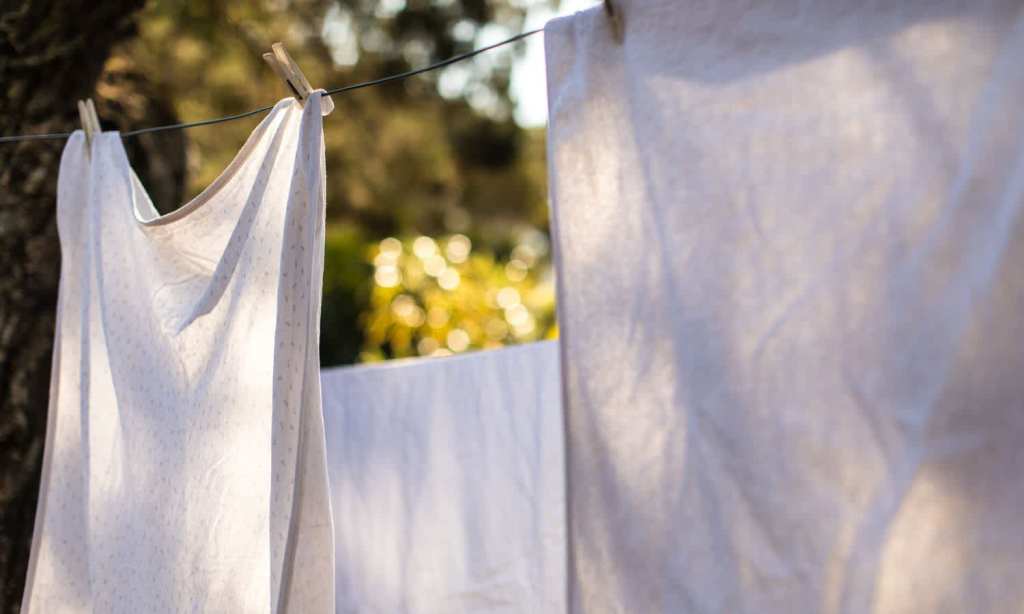Our focus on hygiene has skyrocketed since COVID-19 became a reality in our lives and there has been much information about how the virus lingers on surfaces.
In response to this, many people have taken to washing their clothes straight after returning from a trip to the shops and diligently sanitising items like phones, wallets and handbags.
So, when it comes to washing clothes, sheets and towels, how often should we actually be doing this — especially in the time of COVID-19?
According to University of Sydney postdoctoral research associate, Hannah Sassi, who specialises in environmental microbiology and virology, it all comes down to your individual lifestyle.
“For example, your job, how often you exercise, if you have any pets,” Sassi told the Sydney Morning Herald. “It also depends on the time of year and where you spend most of your time.
“Linens, like bedsheets, can carry a lot of dirt, bodily fluids (drooling, sweating, etc) and dead skin or debris. So it’s recommended these are laundered and changed every one to two weeks.”
When it comes to hand towels, these need to be changed far more regularly. Hand towels should be washed and replaced with a new one every few days as it’s a shared household item.
“This means, inherently, they will be ‘dirtier’ than your personal towel for showering or face washing,” Sassi told SMH.
While the chances of coronavirus surviving on items like towels are low, “survival increases on damp soft surfaces, though. Allowing hand towels to completely dry out between uses will help decrease the virus survival,” Sassi said.
Even if you’ve mainly been working from home and not leaving the house a whole lot, you should still be regularly washing your clothes. According to Canstar Blue, the body is always shedding dead skin cells.
“Fun fact — 99% of household ‘dust’ is actually human skin. Combine that with sweat and oil secreted from your skin, and that’s a lot of grime that your clothes collect and keep close to your body.”
Apparently, it’s not a build-up of sweat that makes our clothes smell but rather bacteria.
“It’s the bacteria that everyone has living on their skin, which eat up all of that delicious sweat and sloughed-off dead skin cells and excrete it as stinky acids,” April Broadbent wrote for Canstar Blue.
“The particular fatty type of sweat produced by glands in the genitals, breasts, armpits and (weirdly) eyelids become especially stinky when broken down by hungry bacteria.”
So, washing your textiles frequently is necessary to get rid of this bacteria. We’ve broken down washing times on a few of your most used items:
☆ Sheets: Change and wash your sheets every one to two weeks. If you’re someone who sweats a lot, or doesn’t shower before bed (what are you doing with your life?) then try to aim for once a week. Otherwise, every second week should be fine.
☆ Towels: Wash your personal bath towel at least once a week, but hand towels should be swapped out every two to three days. Make sure your towel is drying off completely between uses as well.
☆ Workout gear: Wash after every wear. If you’ve done anything more physical than a moderate walk, your workout clothes need to be washed. According to Canstar Blue, “when you’re doing activities that leave you producing far more sweat than you usually do, you’re offering your skin’s bacteria a mighty feast.
“Wash that sports uniform or gym outfit after every wear — even after just a one-hour workout — to avoid that gym smell and keep your skin as healthy along with the rest of your body.”
☆ Other clothes: This depends on you. Have you been to the office or on public transport? In that case, chuck it in the wash when you get home. If you’ve been slothing around the house in a pair of trackies? Those probably can be worn a few times before getting washed.
COVID-19 or not, washing your clothes, sheets and towels on a regular basis will keep you feeling fresh and clean.
When it comes to washing the clothes and bed linen of someone with COVID-19, that’s a completely different ball game. Read how to properly launder the textiles that have been in contact with COVID-19 here.
The current health crisis is evolving rapidly. If you suspect you or a family member has coronavirus you should call (not visit) your GP or ring the national Coronavirus Health Information Hotline on 1800 020 080.







